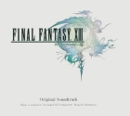
|
|
Tales of Destiny PS2 Version Premium Soundtrack :: Review by Chris
 |
Album Title: | Tales of Destiny PS2 Version Premium Soundtrack |
| Record Label: | Namco Bandai | |
| Catalog No.: | Promotional | |
| Release Date: | November 30, 2006 | |
| Purchase: | Buy at eBay |
Overview
A pre-order bonus for 2006's PlayStation 2 remake of Tales of Destiny was the Orange Gumi Dramatic DVD. It featured 12 arranged tracks from the first four games of the Tales series — Phantasia, Destiny, Eternia, and Destiny 2 — created by Motoi Sakuraba. Given Sakuraba's heavy work schedule and the album wasn't commercially available, one would be forgiven for expecting a half-hearted effort. This turns out not to be the case. The creativity and refinement of the arrangements indicate that Sakuraba wanted to give the Tales series proper arranged treatment for quite some time. He relishes the opportunity regardless of the unusual medium.
Body
One of the series' first amazing progressive rock themes — Phantasia's "Final Act" — receives the honours of opening the album. At the sacrifice of originality, the trumpet is rejected in favour of the rock organ for the main melody. This allows Sakuraba to expose his characteristic progressive rock style with an otherwise faithful and enjoyable interpretation complete with new solos and epic interludes. Eternia provides some of the most enjoyable battle themes here. While "Eternia Mind" is an uplifting straightforward rendition, Sakuraba's eccentric side is demonstrated with the abstract blends of rock and techno in "Mid Boss 2" and the witty jazz-influenced synth licks and faux-horror moments of "Celestia Battle". Destiny 2's "Wheel of Fortune", while one of the more faithful arrangements, features a very persuasive blend of Baroque and progressive rock elements. The gothic influences reach their peak with Phantasia's "Who is Good or Evil". With organ, harpsichord, chorus, orchestra, and distorted synth all appearing in one theme, it's guaranteed to give nightmares.
The approach to most arrangements is far from straightforward. Destiny's "Lion ~ Irony of Fate" is given an especially multifaceted transformation. The arrangement is built on a blend of grungy rhythm guitar riffs and punctuated string motifs, the former novel in itself. The treble elements, in contrast, include beautiful trumpet melodies, emotional keyboard and string interludes, and even some spiritual vocal samples. The overall sound is fulfilling on so many levels. Destiny's "Mysterious Night" — originally an atmospheric but underdeveloped chime and vocal theme — is given a surprising interpretation here. Initially interpreted with lush piano and strings, the arrangement unexpectedly builds into an uplifting action theme and then takes several more twists and turns along the way. The original clearly inspired deep emotions from Sakuraba and the result is nothing short of spectacular. Despite the inclusion of two themes, the development of Destiny 2's "The Decision to the Future" is much more fluid and subtle overall. It's a beautiful journey.
Moving to the most emotional pieces, Destiny 2's "Dona Nobis Pacem" is given a surprising piano rendition. The initial melodic emphasis gradually disappears as the theme moves into elaborate romantic improvisations. The string and chorus work faintly enhances the soundscape without detracting from the intrinsic emotional drive of the piano passages. Phantasia's "I Miss You" is perhaps the most enlightening track on the soundtrack. Once again, the small ensemble use and eventual orchestration shows much more maturity than the original, the occasional obnoxious feature aside. The arrangement achieves a dramatic arch so convincing that it could be the ending themes of one of his tri-Ace epics. Moving to the final track, Destiny's "Silent Night" is given a simple chime and piano rendition. Once again, however, Sakuraba takes the arrangement in a bold new direction first with an uplifting orchestral passage and then with a brisk take on "Endless Dream". It isn't one of the most sophisticated arrangements, but it compensates with its catchiness and fun factor.
Summary
This album is filled with the deep passions and unrestricted creativity of Motoi Sakuraba. There are a few straightforward progressive rock arrangements featuring enhanced synth and new improvisations. However, most tracks go way beyond their source material to exhibit extraordinary character or emotion. Although it is fantastic that Japanese customers were able to experience such a bonus item, the album really deserved a commercial release. At least, by demonstrating the potential of Tales arranged music, it inspired successors including the commercially available if less diverse Tales of Series Battle Arrange Tracks and Tales of Series Piano Arrange Tracks. If you're a Sakuraba fan, relish any opportunity you get to hear this album.

